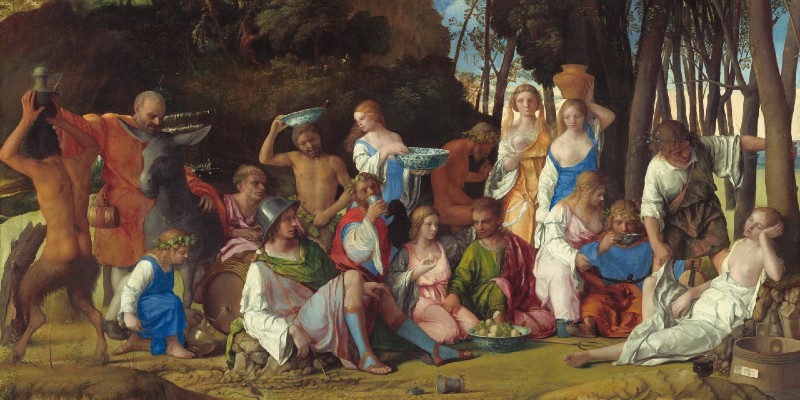
Fit for the Gods: Chinese porcelain and collecting practices at the court of Ferrara Dr Leah Clark, University of Oxford
Event details
History of Art Research Seminar
Giovanni Bellini’s Feast of the Gods is well known as one of the earliest representations of Chinese porcelain in Italy. Painted for one of the famed camerini of Duke Alfonso d’Este of Ferrara and later repainted by a compatriot, Titian, and the Ferrarese Dosso Dossi, it is often assumed that Bellini copied Chinese porcelain he had seen in his native city of Venice.
Yet this talk will consider instead how Bellini may have been referencing the large porcelain collection held by the Este, housed in spaces such as the previously unknown Stanza delle Porcellane. A narrow art historical focus on the paintings destined for the camerini and their literary interpretation and programme, has ignored the role of material culture (including porcelain) across the rooms. While commissioning the paintings and objects for his camerini, Alfonso was also busy building a spezieria or pharmacy and decorating it with glasses and ceramics designed and procured by the artists Titian and Dosso Dossi.
This talk will pay attention to contemporary interests in technological innovation, including the manufacturing of ‘counterfeit’ porcelain in Ferrara, arguing that an emphasis on materials and their transformative qualities was a theme running throughout the paintings, but also in the objects of display, and in the larger interests of Duke Alfonso. The inclusion of porcelain in Bellini’s Feast of the Gods is not simply a representation of Alfonso’s porcelain collections and his interests, but rather, as this paper will argue, sets up a complex relationship between reality and fiction and the metaphoric capabilities of material culture. This paper will also pay particular attention to the mobility of materials and objects in this era of increasing global connections, demonstrating how there was a porcelain pathway from Naples into Ferrara at the end of the fifteenth century.
[image credit: Giovanni Bellini with Titian and Dosso Dossi, Feast of the Gods, oil on canvas, Venice/Ferrara, 1514/29. The National Gallery, Washington, DC, Widener Collection 1942.9.1.]
About the speaker
Leah R Clark is an Associate Professor and Director of Studies in the History of Art in the Department for Continuing Education at the University of Oxford as well as a Fellow at Kellogg College. Her research has explored the mobility and collection of art objects in the fifteenth century, while her more recent work has looked to the global exchange of objects with particular attention to their associated sensorial practices. Her publications include Courtly Mediators: Transcultural Objects Between Renaissance Italy and the Islamic World (Cambridge University Press, 2023), Collecting Art in the Italian Renaissance Court: Objects and Exchanges (Cambridge University Press, 2018), and European Art and the Wider World 1350-1550, co-edited with Kathleen Christian (Manchester University Press, 2017).